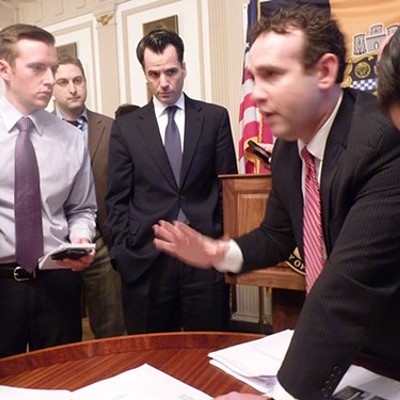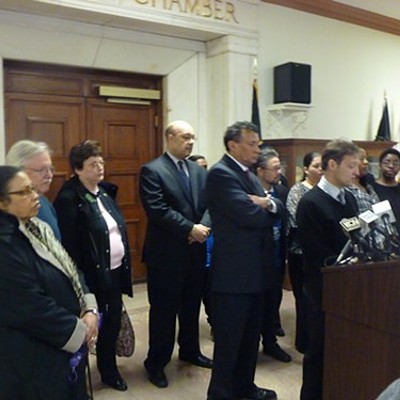Friday, December 5, 2008
Pension for Destruction
Is it possible to be appalled by something, and yet not at all surprised? If so, I guess that's the proper reaction to today's news that the city's pension fund has lost $124 million so far this year.
As Chris Briem, the resident genius on these matters, points out, none of this is terribly unexpected. The pension fund was shaky even when the market was riding high, and everyone knows what the past few months have been like on Wall Street.
The temptation in some quarters will be to blame current Mayor Luke Ravenstahl for all this: After all, folks like City Councilor Bill Peduto have been warning that the past couple years, which have seen relatively pain-free budgets, have been the "eye of the storm." And yet, little has been to solve the problem.
But there's plenty of blame to go around. For one thing, the city's budgets have all met with the approval of not one but two state-created financial oversight boards. And by the time Ravenstahl took office, the pattern of ignoring pension problems was already well established. As City Paper reported way back in 2005, Mayor Tom Murphy -- for all his claims of fiscal responsibility -- left behind pension problems that were even worse than they appeared.
As we noted, Murphy was claiming a pension budget that was only 40 percent funded -- which, as bad as that sounds, was probably too optimistic:
The estimate relies upon a whole range of assumptions that may or may not be correct... For example, the city assumes that through skilled investment, its pension fund can earn a return of 8.75 percent on its own. That's an optimistic number, one based on returns from the stock market before the 2001 crash.
Murphy established a trend that his successor has been only too happy to continue: Marking time, with the consent of the city's financial overseers, and making payments from one year to the next. But ultimately, doing nothing more about the pension time bomb than crossing fingers.
And to be fair, it's not clear they had any real options. The catastrophic collapse in markets means that even if Ravenstahl had sought to shore up the city's pension fund by cutting services, a lot of that money would have disappeared anyway. You could argue that at least this way, Pittsburghers got the benefit of city services they otherwise would have lost. Ironically, doing the "responsible" thing -- cutting operating budgets and raising taxes -- might have just compounded the disaster. We'd still have a dramatically underfunded budget, except we'd probably have a lot more potholes to boot.
It's also worth noting that state-appointed financial overseers were willing to look the other way. Maybe the pension problem is so large that the city simply can't do anything about it? Maybe anyone who really looks at this problem would throw up their hands?
In any case, this isn't just a problem for the city. As we noted not long ago, plenty of city retirees move into suburban communities, where they spend money and pay taxes. If you live in a suburb, it's tempting to say "screw those greedy retirees, and the dummies who gave them their benefits!" But it might be worth reflecting that the foreclosed home we're talking about may someday be the one next door.
And luckily -- if that's the word -- other municipalities are screwed as well. As the P-G story linked above notes, plenty of other governments have watched their pensions evaporate, even if the problems aren't quite as severe as Pittsburgh's. It may be that the financial crisis is so big that it will do what years of speeches and newspaper columns have failed to do -- encourage Harrisburg to come up with an across-the-board solution. Nothing else is going to work.
Tags: Ravenstahl , Slag Heap











